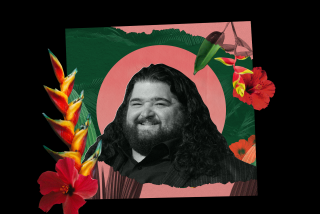Truly a medical anomaly
- Share via
WHEN 19th century English cleric Charles Caleb Colton wrote “imitation is the sincerest form of flattery,” he had no way of envisioning a 21st century universe where “Law & Order” spinoffs would number nearly enough to qualify for their own cable network. Television is such a hungry beast it’s not fair to expect originality around every prime-time corner.
But every so often, despite formula demands and limitations, TV writers deliver a truly singular character we’ve not encountered before. Such was the case when “House” premiered on Fox in November 2004; from the moment the eponymous lead opened his mouth, it was obvious that the brilliant Dr. Gregory House (Hugh Laurie) was no generic made-for-television medicine man.
As abrasive as he is articulate, House cares little for politeness and even less for political correctness. An equal opportunity offender, he says out loud what most of us hardly dare think, and his no-holds-barred sarcasm would surely have blown the stethoscope out of Marcus Welby’s ears. It’s waiting to hear what Dr. House is going to say next -- to patients, to his telegenic posse of racially and sexually balanced co-workers, to anyone unlucky enough to cross his acerbic path -- that keeps a growing audience coming back for more.
The relationships among staff members at Princeton-Plainsboro Teaching Hospital have shown symptoms of interpersonal development, but when it comes down to it, “House” is essentially a well-written variation on the same theme from one episode to the next. It’s a stand-alone malady-of-the-week kind of show, with a hearty dose of Holmesian mystery added to the medical mix. So if it’s pretty much the same old same-old week after week, why are people watching in such impressive numbers?
What show creator David Shore has spawned in House is a three-dimensional, grown-up character -- petulant outbursts notwithstanding. In part because we see the same people week after week, television has evolved into a more character-driven medium than feature films, where such a fully formed human-like being is a rarity -- and let’s face it, they’re not even all that easy to find in literary fiction these days. Tony Soprano certainly fits the one-of-a-kind bill. Dr. House also compels viewers to come back for a weekly dose -- and we don’t even have to cough up premium HBO bucks to see him.
Television has seen its fair share of curmudgeonly medicos -- from “Ben Casey” to “Quincy” to Mark Craig (William Daniels) on “St. Elsewhere” to Mandy Patinkin’s irascible “Chicago Hope” brain surgeon -- but House has elevated the sardonic retort to a laugh-out-loud art form. He suffers neither fools nor wise men gladly; this guy doesn’t even soften up much around a doe-eyed child. House’s biting catchphrases haven’t entered into the cultural vernacular, but EBay merchants are doing a brisk business selling T-shirts emblazoned with such House-isms as “Everybody Lies,” “Perseverance Does Not Equal Worthiness” and “Humanity is Overrated.”
House genuinely doesn’t care if people like him, by episode’s end he hasn’t had a warm and fuzzy epiphany, and this is precisely why audiences love him. (The dazzling blue eyes don’t hurt, either.) He limps -- certainly a metaphor for his wounded psyche as well as the physical manifestation of serious injury -- but wields his cane more like a weapon than a sign of weakness. Nevertheless, for all the scorn House heaps upon those around him, there’s a magnetic appeal to Laurie’s portrayal; he didn’t top People magazine’s list of sexiest TV doctors for his diagnostic derring-do. (Did I mention the dazzling blue eyes?)
It’s a career-defining role for Laurie, a Cambridge-educated Brit best known in this country until now for playing effete, ineffectual types such as the dad in the “Stuart Little” films, Vincente Minnelli in the miniseries “Life With Judy Garland: Me and My Shadows” and Bertie Wooster in “Jeeves and Wooster” on PBS (which costarred his longtime writing partner Stephen Fry).
Dr. House is always the smartest guy in the room -- and can be counted on to be the first to point this out. There’s lots of arcane med-speak on the show, but the good doctor expects those around him to keep up, colleagues and viewing audience alike. He must be doing something right: In addition to curing nearly all of his patients, House’s namesake show ranks in or near the Nielsen Top 10. No doubt the “American Idol” lead-in helps, but Simon Cowell, who before House was the network’s reigning prince of put-downs, was nowhere in sight at the beginning of the season and “House” was still a big hit.
Watching House, the audience can’t help but wait for the moment when we see the mushy soft-boiled egg beneath the hard shell. But he hasn’t cracked. The closest was when House was briefly reunited with his true love, played by Sela Ward. But even that was short-lived, and then House did the uncharacteristically unselfish thing and sent her back to her husband, a gesture reminiscent of Rick in “Casablanca” -- one of the big screen’s classic reluctant romantics.
So what’s the message in all this for TV producers? If you’re going to create a show that’s something of a one-trick pony you’d better make sure you have the right pony and a hell of a trick. Which is exactly what you get with Hugh Laurie in the “House.”
More to Read
The complete guide to home viewing
Get Screen Gab for everything about the TV shows and streaming movies everyone’s talking about.
You may occasionally receive promotional content from the Los Angeles Times.






